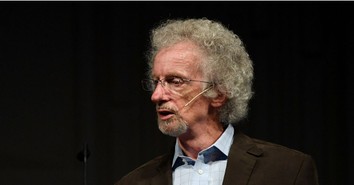I Still Do...and Always Will

In some marriage ceremonies, the man and woman respond not with "I do" but with "I will." That answer carries a sense that the person promises to have and to hold, love and cherish, in sickness and health, not only in the now, but also in the future.
Unfortunately, nearly 50 percent of them are swearing falsely, even if they don't know it at the moment. It's a sad fact that half of all marriages end in divorce. Sadder yet, the divorce rate among Christians matches that of the culture at large.
Dennis Rainey, founder of FamilyLife Ministries in Little Rock, Ark., thinks that's a travesty.
"We've reduced marriage to a contract," he says. "A contract has terms, exit clauses, performance requirements."
And even when marriage is regarded as just a contract, Rainey adds, it's a pretty weak one; it's easier today to get out of a marriage than a contract to buy a used car. If a spouse does not live up to certain expectations, the "contract" is regarded as null and void. "We're in love with feelings," he says. "We're in love with ourselves, asking, 'What's in it for me?' "
But marriage is not just a contract, Rainey counters. It is a covenant, something wholly other, a much deeper commitment than just signing on a dotted line. "You don't make a covenant with the guy who sells you a car," he says.
More Than Laws
Rainey wants to declare war on this attitude, first within the Christian community, then in the wider culture.
"Where is the church?" Rainey asks. "We, the church, need to reclaim covenant as our territory. Christians should be the guardians of marriage and the enforcers of covenant."
While some states have worked to pass covenant marriage laws, so far only Louisiana and Arizona have done so. That law gives couples planning to marry the option to choose a route that requires them to undergo premarital counseling, and, should problems arise in the marriage, it requires them to undergo marriage counseling before they can divorce. The law also limits the grounds for divorce: adultery, physical abuse of a spouse or child, a spouse committing a felony, or after two years of legal separation. In short, it makes the couple think a bit longer before they exchange vows, and it makes it harder to get out of them.
"I think we need laws," Rainey says, "but the response to them has been underwhelming."
The solution, he says, is not either/or, but both/and. Strive to make divorce harder legally while working harder to keep marriages together through Christian counseling and accountability.
"Do I believe there are some situations where divorce is acceptable?" he asks. "Sure, but it needs to be rare, not expected, especially in the Christian community. I don't believe divorce should be the first, second or third choice, but the last choice."
Put It in Writing
Rainey wants to reclaim the concept of covenant in marriage, and the best way he sees to do this is by having churches conduct covenant marriage ceremonies, both for newlyweds and for couples renewing their vows.
Rainey and his wife, Barbara, got the idea when they were preparing for the marriage of their daughter Ashley in July 1997.
"We wanted some way to help them keep their promises," Dennis says. They hired a calligrapher, who wrote out the marriage vows on a certificate made of 100 percent cotton―"to signify purity," Barbara says.
Ashley and her husband, Michael, signed it, as did both sets of parents and a hundred members of the congregation.
"That was a symbol of their covenant," Dennis says, "witnessed before the entire congregation. There's something about putting it in writing that makes it a formal covenant. We need such symbols to elevate covenant back to its rightful place in marriage."
Originally published December 24, 2002.







